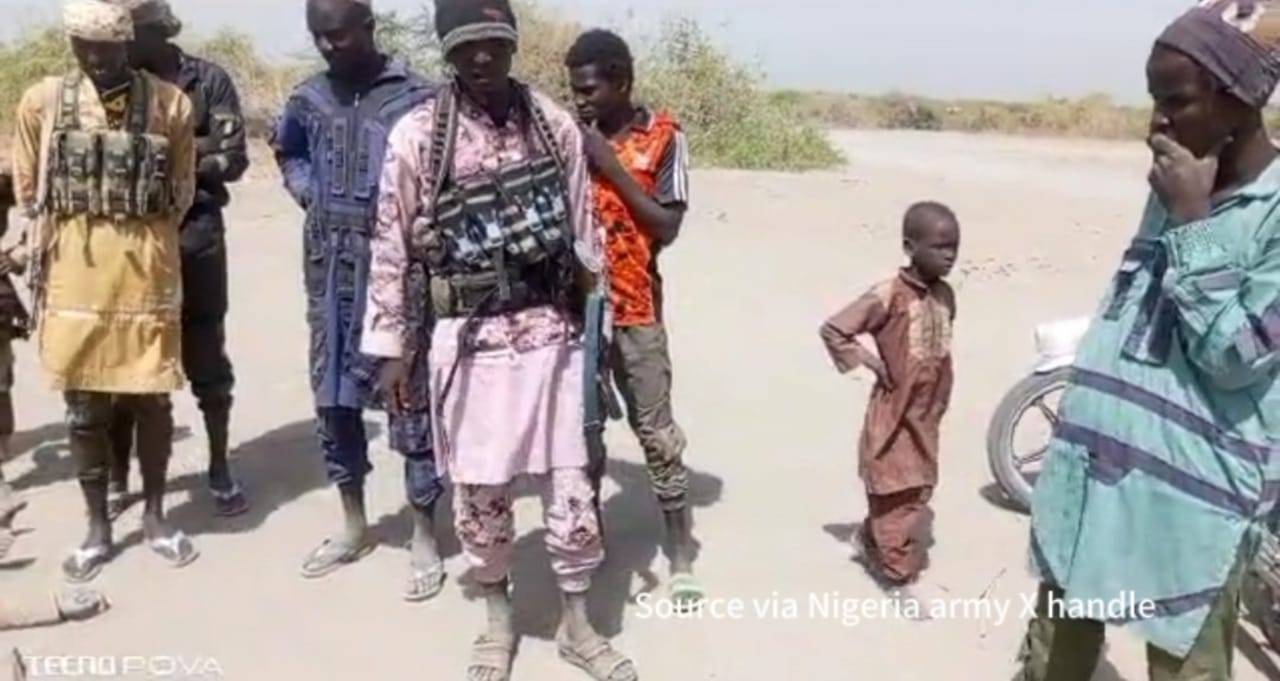At least 35 fighters belonging to the Boko Haram Buduma faction met their demise in a series of fierce clashes with the Islamic State of West African Province (ISWAP) group along the shores of Lake Chad. Reports indicate that the confrontation unfolded when ISWAP militants, under the leadership of Mallam Akilu, a prominent ISWAP Commander, launched coordinated attacks on Boko Haram strongholds in Habujan Ruwa. With over 70 fighters, the ISWAP faction engaged in intense combat, resulting in the death of nine terrorists and the seizure of their weaponry on March 11, 2024.
The violence escalated further on the same day, with additional skirmishes occurring near Lariski, situated south of Jabullam in Abadam Local Government Area (LGA). The clashes intensified over the following days as ISWAP forces made significant advancements towards Tumbum Ali in Kukawa LGA, effectively cutting off all access routes for Boko Haram militants. Amid the onslaught, ISWAP successfully neutralized 26 Boko Haram insurgents, while 11 others were captured alive, and their weapons were seized.
Civilian Casualties and Abductions Amidst the Conflict
Regrettably, the clashes between the rival factions not only claimed the lives of combatants but also resulted in civilian casualties and abductions. During the heavy gun battle, two fishermen tragically lost their lives as they were caught in the crossfire, while two others were abducted by ISWAP militants. The incident underscores the perilous impact of the conflict on innocent civilians who find themselves inadvertently embroiled in the violence between the warring factions.
Furthermore, sources indicate that the wali (leader) of ISWAP, Abu Musa Almangawi, has issued death sentences against all fighters operating under Abou Umaymah, also known as Bakura Buduma. This development signifies the escalating tensions and internal strife within the jihadist groups vying for supremacy in the region. Despite both groups’ shared animosity towards government forces, their deadly clashes highlight the volatile nature of the power struggle for territorial control and ideological dominance.
ISWAP and Boko Haram: Implications for Regional Security and Counterterrorism Efforts
The recent clashes between Boko Haram and ISWAP not only pose significant humanitarian concerns but also have broader implications for regional security and counterterrorism efforts. With both factions engaged in fierce battles for territorial dominance, the stability of the Lake Chad Basin region remains precarious. The escalation of violence underscores the persistent threat posed by jihadist groups to civilian populations and underscores the challenges faced by regional authorities in combating terrorism effectively.
Moreover, the emergence of internal rifts within ISWAP, as evidenced by Abu Musa Almangawi’s actions, highlights the complex dynamics within jihadist organizations and the potential for further fragmentation. As governments and international partners continue to prioritize efforts to combat terrorism in the Sahel region, the need for comprehensive strategies that address not only military intervention but also socio-economic development and community resilience becomes increasingly apparent. The clashes serve as a stark reminder of the urgent need for coordinated action to mitigate the threat posed by extremist groups and promote lasting peace and stability in the region.
By providing comprehensive coverage of the recent clashes between Boko Haram and ISWAP, this report seeks to offer insights into the evolving security landscape in the Lake Chad Basin region and the challenges confronting counterterrorism efforts. As the conflict continues to unfold, vigilance and concerted action are paramount to address the root causes of extremism and prevent further loss of life in the affected communities.
Consistent Infighting Between ISWAP and Boko Haram Followers: A Recipe for Peace in Northeast Nigeria
In recent developments within the volatile landscape of Northeast Nigeria, a glimmer of hope emerges amidst the tumultuous rivalry between the Islamic State West Africa Province (ISWAP) and Boko Haram insurgents. The persistent infighting between factions loyal to these extremist groups has inadvertently provided a temporary respite for the war-weary residents of the region. This unexpected turn of events, while fraught with complexity, presents a potential opportunity for the restoration of peace in the embattled North East.
The incessant clashes between ISWAP and Boko Haram adherents have inadvertently weakened the capabilities of both groups, leading to a relative decline in large-scale attacks and acts of violence against civilians. As power struggles ensue and internal divisions deepen, the attention of these militant factions is increasingly diverted towards internal conflicts rather than external aggression. This shift in focus has somewhat alleviated the immediate threat posed to vulnerable communities, offering a semblance of relief in the midst of perpetual turmoil.
Sustained Military Efforts Essential for Lasting Peace
Amidst this fragile truce, it becomes imperative for the Nigerian military to maintain and bolster its ongoing efforts in combating terrorism within the region. While the inter-factional discord may present a momentary lull in hostilities, it also underscores the necessity for sustained vigilance and proactive measures to prevent the resurgence of violence. The military’s relentless pursuit of extremist elements remains crucial in dismantling the terrorist infrastructure and ensuring the long-term security and stability of Northeast Nigeria.
In light of the evolving dynamics of the conflict, military strategists must adapt their tactics to capitalize on the internal divisions within the insurgency. By exploiting the vulnerabilities exposed by infighting, security forces can effectively disrupt enemy communications, disrupt supply chains, and dismantle key operational networks. Furthermore, concerted efforts to engage with local communities and garner support in the fight against terrorism will be pivotal in bridging the gap between military operations and civilian cooperation. As the military endeavors to root out the remnants of Boko Haram and ISWAP, collaboration with the populace becomes paramount in achieving lasting peace and security in the North East.
Engaging the Community: A Path to Sustainable Peace
In the pursuit of peace, the collective efforts of both the military and civilian populace are indispensable. Beyond the battlefield, the people of Northeast Nigeria must actively contribute to the eradication of extremism by providing timely and actionable intelligence to security forces. Through a symbiotic relationship built on trust and cooperation, communities can play a vital role in identifying and neutralizing threats posed by insurgents. Empowering local residents with the means to safeguard their own neighborhoods not only enhances security but also fosters a sense of ownership and resilience against future incursions.
In parallel, concerted efforts towards reconciliation and rehabilitation are essential in addressing the root causes of radicalization and extremism. By addressing socio-economic disparities, promoting education, and fostering interfaith dialogue, stakeholders can mitigate the underlying grievances that fuel the cycle of violence. Moreover, initiatives aimed at reintegrating former combatants into society offer a pathway to redemption and reconciliation, paving the way for sustainable peace and prosperity in Northeast Nigeria.
The persistent infighting between ISWAP and Boko Haram factions presents a fragile opportunity for peace in Northeast Nigeria. However, achieving lasting stability requires sustained military efforts, community engagement, and holistic approaches to address the root causes of extremism. By capitalizing on the divisions within the insurgency and fostering collaboration between security forces and local communities, Nigeria can chart a course towards a future free from the scourge of terrorism. As the nation stands at a crossroads, the pursuit of peace in the North East remains an imperative that demands unwavering commitment and collective resolve.
Table of Contents
Discover more from OGM News NG
Subscribe to get the latest posts sent to your email.












